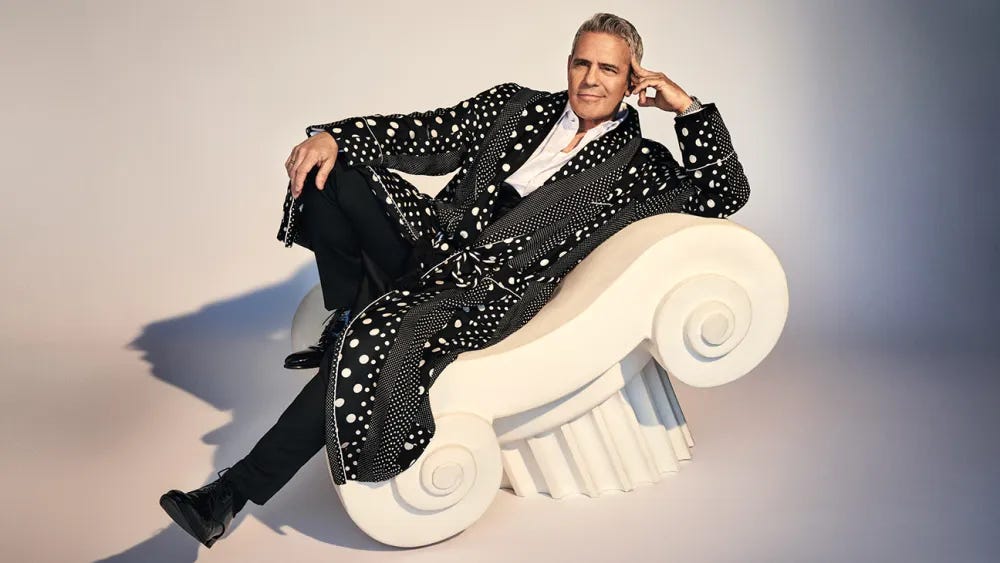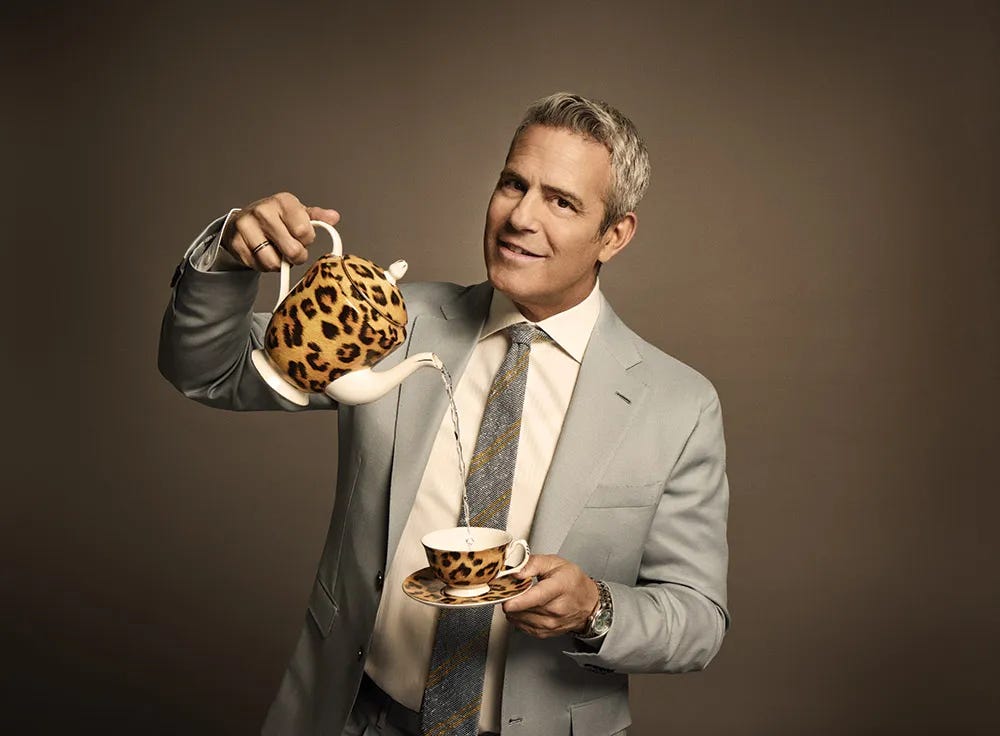The King of Bravo Speaks
Andy Cohen speaks out on ‘Real Housewives’ Reckoning: “It’s Hurtful. But I Have No Regrets”
An article by Maer Roshan in The Hollywood Reporter highlights how former Bravo stars are making accusations and filing lawsuits over alleged sexism, racism, and substance abuse on set. However, the network's top host (and Anderson Cooper's drinking buddy) is celebrating 15 years as the face of the network, hosting various reunion shows along with 'Watch What Happens Live.'
In the article, Andy Cohen talks about his career, the making of The Real Housewives franchise and the drama behind the scenes, his response to Bethenny Frankel, and becoming a father:
Some critics have complained that you and Bravo have been slow to adapt in some ways. Eboni Williams, the first Black New York Housewife, says she encountered pervasive racism on the show.
I can’t speak to her particular experience, and I’m no longer in charge of programming decisions there, but I’m proud of all the work that Bravo has put into making their shows more representative of the country’s demographics. George Floyd was an important cultural shift that forced us to look at all of our programming. Bravo made it a mandate to diversify its shows. I mean, they had a show, Summer House, that was like a bunch of white people in the Hamptons. Southern Charm was a bunch of white people tomcatting in Charleston. They thought, “Why are a lot of the shows so segregated?” They decided that there needed to be more representation across the dial. And they did it.
Brandi Glanville and Caroline Manzo have both complained about sexual harassment. And Leah McSweeney told Vanity Fair that ratings-mad producers hid liquor bottles on the set and sabotaged her sobriety. Are these isolated complaints or symptoms of a larger problem?
Unfortunately, I can’t talk about some of these things. What I’ll say about the alcohol is that we have so many sober people and people who have gotten sober on the show, like Countess Luann [de Lesseps]. We have people who’ve never had a drink during the entire run of the show. Jill Zarin. Kandi Burris. Heather Dubrow will just have an occasional glass of champagne. So sure, there are people who drink. There are many people who never drink. We don’t force anyone to do anything. But no one is secretly hiding liquor bottles on set. That’s ridiculous. We’ve been very supportive of people’s sobriety.
But Bravo wouldn’t be the first network to use liquor to gin up some drama.
We don’t need to gin up drama! Have you seen Ramona Singer on a random Tuesday at 1 p.m.? Have you ever run into Lisa Rinna at noon? Lisa Rinna does not need a glass of rosé in order to tell you exactly how she is feeling. Margaret Josephs only drinks Diet Coke, and she is a truth cannon wherever she goes. I don’t think Teresa Giudice would say that it was the red wine that caused her to flip that table! We start filming the reunions at 6 a.m. for God’s sake!
There are now calls for reality stars to be unionized, with your old friend Bethenny Frankel leading the charge. The Housewives have made Bravo millions by opening up their lives to the cameras. Shouldn’t they be paid as much as actors?
I have a lot to say about that. But I need to make clear that I’m speaking as an independent producer. This is not Bravo speaking. This is my take on it. If you look at shows like American Idol, Survivor, The Bachelor or the Below Deck people, 90 percent or more of the reality stars on them are on for one season or less. Also, acting is a full-time profession. You don’t go to school to be a reality star. Reality stars typically have other jobs. They’re bar owners, they’re designers. They’re doctors. I think the way that Bravo pays people is that it’s a buyout — they’re buying them out for a show that can be distributed in certain ways, and the longer you stay on, the higher your salary gets. And salaries for people who have been on a long time are really high. Look, you’re not drafted into the Real Housewives. You either want to be on the show or not, and you either see it as having some greater benefit for you or not. You have a business you’re trying to launch, you have a music career you’re trying to launch, you want exposure. And so you say, “OK, I’m going to look at this for the long game and maybe parlay my exposure on the show into other lucrative opportunities.” And many of them do just that.
You had close ties to some of your critics. Bravo helped make Bethenny [Frankel] a multimillionaire. Have you felt hurt by some of the criticism you’ve received? Do you have any regrets about how you handled anything?
You know, I am a nostalgic person. I’m someone who appreciates everyone being on the same ride. I’m incredibly proud of the close relationships I’ve built in my 20 years at the network. I’m super proud of what we’ve built and of everybody who’s been a part of it. I think most people involved with these shows have been very grateful for the platform, but there will always be a few with complaints. Obviously, it’s no fun to be a target. So, yes, it’s hurtful. But I have no regrets about the way I’ve handled anything. I think everything that happens in your life informs the next thing that happens in your life. That’s the way I look at all this. I know what the truth is and I know how I’ve conducted myself, and I walk tall every day on that. There are legions of fans who are passionately devoted to this brand. It’s a tonic that helps them get through the pains and obstacles in their lives. When I got onstage at BravoCon, I was just blown away — 35,000 screaming people who came in from all across the globe. It was an intense experience that helped me put all this in perspective.

You once said that you’ve been preparing to be famous since you were 7. Has it been as fulfilling as you imagined?
Anderson [Cooper] always says that no one enjoys being famous more than I do. I view it as a gift. I used to walk my dog three or four times a day in New York City and people were like, “Hey, Andy!” How great is that? I live in this big city and everyone calls my name and says hello. I have a personal relationship with my audience. They feel like they know me because they do know me. How I am on TV and on the radio is pretty much the same as I am in person. But there’s a part of me that still can’t believe that I can get reservations at fancy restaurants. I can’t believe I get into the Met Ball!
You’re single, right? How do you meet people when you’re a celebrity?
I’m on all the apps! I’m on Grindr, Tinder, Scruff, Hinge, Raya …
How’s that working out for you?
Well, I got kicked off Grindr once because somebody reported me for impersonating myself. People are like, “Nice try. Why are you sending me Andy Cohen’s pictures?” But once in a while it will work out.
What made you decide to become a single dad?
I always knew that I wanted to be a parent. I knew I’d be good at it. But when I first came to New York, I became hypnotized by the city and the media and celebrity and all that entailed. And I love all that. I love media, I love New York. I love celebrity. I had an incredible time. I was on yachts and going to parties in the Hamptons with Barry and all that stuff. But after a while, I started to think to myself, “Is this what I’m going to do for the rest of my life? Is this all there is for me?” Eventually the holidays started becoming lonely. I’d go home to St. Louis for Thanksgiving, and a lot of my high school friends weren’t there anymore or they had a boatload of kids. So I started to wonder where I fit in. I mean, I love the party, but I don’t want to be the last guy at the party. Then when I turned 49, I had a boyfriend who was 20 years younger who did not want kids and didn’t want to get married. And I was like, OK, I’ve got to move on. If I’m going to have kids, it has to happen now.

Queer Eye put Bravo on the map, but Real Housewives took it to a new level. How did that show happen?
It all started when this ad guy named Scott Dunlop brought us this video of his neighbors in Orange County. At the time, Desperate Housewives was a huge hit on ABC; his big idea was to bring Desperate Housewives to life. And there was no better place for it than Orange County. The women were bored and rich. Their hair was big and blond, their boobs were bigger. One woman, Vicki [Gunvalson], even had a grotto in her backyard. But Scott’s idea was maybe a little less grounded in reality. We wanted it to be a docuseries about these women and their friendships.
At what point did you know it would be a huge success?
It took a while, actually. We almost pulled the plug on the first season. The production team we hired would rave about all the great scenes they were getting on tape, and when we watched them, it was just … underwhelming. I remember a meeting where we talked about if we wound up killing the Real Housewives, what would the loss be? By that time, we were $400,000 in, so we decided to just push forward.



